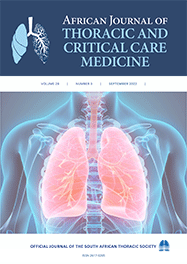Original research

Respiratory technologists in the frontlines against COVID-19
Abstract
Background. The COVID-19 pandemic overwhelmed healthcare resources globally, but especially those of resource-limited countries. Strategies to supplement the number of healthcare workers attending COVID-19 patients had to be implemented. Several institutions used non-respiratory clinicians to work in COVID-19 wards. At Universitas Academic Hospital (UAH), Bloemfontein, South Africa, respiratory technologists were requested to assist with managing the oxygen supportive care of patients with severe COVID-19 and respiratory failure.
Objectives. To highlight the contribution that respiratory technologists made in the management of severe COVID-19 pneumonia patients by describing the baseline characteristics and mortality of patients with COVID-19, whose oxygen supportive care was managed primarily by respiratory technologists at UAH.
Methods. This was a retrospective study. The investigators extracted data from the hospital files of all adult patients admitted with severe COVID-19 to UAH and where respiratory technologists were involved in their care between 1 January and 31 December 2020.
Results. A total of 781 patients were admitted to UAH, of whom 106 fulfilled the inclusion criteria. The majority of the patients were female (n=68; 64.1%), and the median age (interquartile range (IQR)) was 59.5 (51 - 68) years. Hypertension (n=69; 65.1%) and diabetes mellitus (n=39; 36.8%) were the most frequent comorbidities. At the time of admission, the median oxygen saturation was 92% and the median respiratory rate oxygenation (ROX) index was 3.2. The median length of stay was 7 days and the mortality was 41.5%.
Conclusion. The clinical characteristics and mortality of patients whose oxygen support was managed by respiratory technologists were similar to those in previously reported studies from resource-limited settings. Respiratory technologists can form a valuable addition to the front-line team when clinicians and nurses are faced with overwhelming patient numbers in subsequent COVID-19 surges and where the mainstay of treatment is oxygen supportive care.
Authors' affiliations
S D Maasdorp, Division of Pulmonology, Department of Internal Medicine, and Division of Critical Care, Department of Surgery, Faculty of Health Sciences, University of the Free State, Bloemfontein, South Africa
M Pretorius, Division of Pulmonology, Department of Internal Medicine, Faculty of Health Sciences, University of the Free State, and Universitas Academic Hospital, Bloemfontein, South Africa
P Pienaar, Division of Pulmonology, Department of Internal Medicine, Faculty of Health Sciences, University of the Free State, and Universitas Academic Hospital, Bloemfontein, South Africa
E Rosslee, Division of Pulmonology, Department of Internal Medicine, Faculty of Health Sciences, University of the Free State, and Universitas Academic Hospital, Bloemfontein, South Africa
A Alexander, Division of Pulmonology, Department of Internal Medicine, Faculty of Health Sciences, University of the Free State, and Universitas Academic Hospital, Bloemfontein, South Africa
A van der Linde, Division of Pulmonology, Department of Internal Medicine, Faculty of Health Sciences, University of the Free State, and Universitas Academic Hospital, Bloemfontein, South Africa
C van Rooyen, Department of Biostatistics, Faculty of Health Sciences, University of the Free State, Bloemfontein, South Africa
Full Text:
Cite this article
Article History
Date published: 2022-07-15
Article Views
Full text views: 130
Refbacks
- There are currently no refbacks.
African Journal of Thoracic and Critical Care Medicine| Online ISSN: 2617-0205
This journal is protected by a Creative Commons Attribution - NonCommercial Works License (CC BY-NC 4.0) | Read our privacy policy.
Our Journals: South African Medical Journal | African Journal of Health Professions Education | South African Journal of Bioethics and Law | South African Journal of Child Health | Southern African Journal of Critical Care | African Journal of Thoracic and Critical Care Medicine| South African Journal of Obstetrics and Gynaecology |



.jpg)